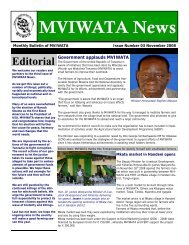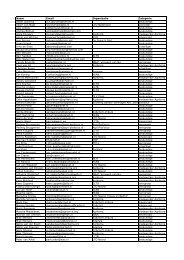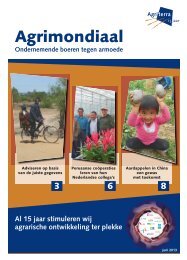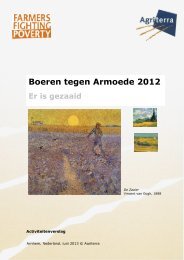télécharger - Agriterra
télécharger - Agriterra
télécharger - Agriterra
You also want an ePaper? Increase the reach of your titles
YUMPU automatically turns print PDFs into web optimized ePapers that Google loves.
Selling cassava on thefor the creation of a system of micro credits for small farmers.has also lost interest. Ricardo Quirós: "The Banco NacionalThe prosperous start of the programme is partly due to theinternational market doesThis looked promising at first. All the ingredients for successexpected a lot from the Dutch investors. When their expectationsmembers of the Dutch Christian Social women’s movementnot offer many perspectives.were there. The Rabobank Foundation, <strong>Agriterra</strong> and some fourproved overly optimistic and it turned out that the MNC wasPassage. They decided to help the female farmers in Costa RicaAt first, the DutchCosta Rican agricultural organisations were willing to cooperate.unreliable, their initial enthusiasm soon faded."and are developing a guarantee fund of 50,000 dollars.cooperative societyAfter several exploratory missions and feasibility studies, the<strong>Agriterra</strong> also provides financial support.CeHaVe Landbouwbelangconclusion was that credit is indeed available to the farmers,New lifeDespite the success of its own credit programme, the CNTMC(‘Agricultural Interest’)but that access to those funds is difficult. "It is a fixed ideaThe Costa Rican women who were involved in the project,would love to continue the foundation of the Sistema Nacionalwas interested in cassavathat there is no money available to agriculture", says Jurbecame dejected at the tug of war. Their organisation, thede Financiamiento al Desarollo Rural. The Rabobank Foundationas an ingredient for feed. But eventually, wheat from UkraineSchuurman, account manager at <strong>Agriterra</strong>. "People assumeCoordinadora Nacional para el Trabajo con la Mujer Campesinaand <strong>Agriterra</strong> feel exactly the same way, so all we can do now,turned out to be a cheaper and better alternative.that all the credit goes to industry and export. However, the(CNTMC), ended up starting its own credit programme. Creditis wait for MNC. Jur Schuurman: "The initiative should beIn 2003, <strong>Agriterra</strong> organised a visit from the director ofproblem in Costa Rica is not the supply, but the demand.institute Oikocredit was willing to lend money to the femaletaken by the farmers’ organisation. If they decide to revive theCECORA, dr. Carlos Simancas, to the Netherlands and Spain.Farmers do not get any money because they are not good atfarmers. They also agreed that a number of women would beproject, then we will certainly participate again."The purpose of his visit was to explore the export possibilitiesdrawing up solid business plans."trained in filling out credit applications.■and to obtain advice regarding the sale of cassava. CeHaVe,Cefetra, COREN (Spain), Vivoba and Avebe welcomed theWith those conclusions in mind, two important goals were set:director and gave him useful advice. Due to the situation onestablishing a ‘counter’ where farmers can go to for help, andthe world markets, most advice was limited to exploring theassisting the farmers in presenting their application. A largeopportunities that the Colombian domestic market has to offer.nationwide bank, the Banco Nacional de Costa Rica, was willingA future initiative aims at the possible creation of a broadto cooperate. In all its branches in the countryside there wouldConfederación Campesina and contains a proposal to grantbe a special counter where farmers would be able to presentcredits for primary production, in cooperation with thetheir credit application. The MNC seemed to be the idealRabobank Foundation.organisation to assist the farmers in drawing up their businessplans and credit applications. Offering this non-financial serviceThe Horticultural Exporters Association of Uganda (HORTEXA)would not only give the organisation the opportunity to satisfydid succeed in gaining access to the Dutch market. The exportthe demands of its members, but it would also be able toorganisation is increasingly successful in promoting and sellingstrengthen its own position. However, much to the disappoint-Ugandan fruit and vegetables. From the Netherlands, they getment of all parties involved, the MNC fails to take the necessarysupport from the Centre for the Promotion of Imports (CBI),initiatives. "A missed opportunity", according to Jur Schuurman.The Greenery and <strong>Agriterra</strong>. In 2001 and 2003, a delegation of"If the MNC does not go through with this, then there will soonHORTEXA participated in the Potato, Vegetable and Fruit Fairbe a credit system for which other parties will take the credit,(AGF Totaal) in Rotterdam. Moreover, courses were given andbut the MNC will have missed out on a unique opportunity toworkshops were organised. And through AgriCord, a budgetstrengthen its organisation."will be put aside for the elaboration of a business plan.Meanwhile, products such as okra, passion fruit, peppers,Agreementpineapple and paprika are being introduced in the smaller scaleIn July 2003, years of preparations resulted in the signature ofsupermarkets in the Randstad-region in the Netherlands.an agreement between the MNC, the Banco Nacional and theNevertheless, despite frequent contacts, no large-scale tradeMinisterio de Agricultura (MAG). That agreement was the finalrelations were established between the Dutch importers andmilestone in the project. "After the agreement had been signed,HORTEXA. The stumbling block is the delivery of constantthe MNC ran into internal difficulties", says Ricardo Quirós,quantities that meet the new European regulations. Partnersformer director of the MNC. "We had agreed to start up thesuch as The Greenery turned out to be just too large scale forcredit programme in two regions. The then director abused theHORTEXA.selection of those regions in his re-election campaign and playedthe regions off against each other in an attempt to win votes.In 1996, the Costa Rican farmers’ union Mesa NacionalAs a consequence, no regions were selected at all."Campesina (MNC) realised that small farmers did not haveMeanwhile, a new director has taken over at the head of MNC,sufficient access to credit and decided to launch a programmebut he shows very little interest in the programme. The bank>>4849








